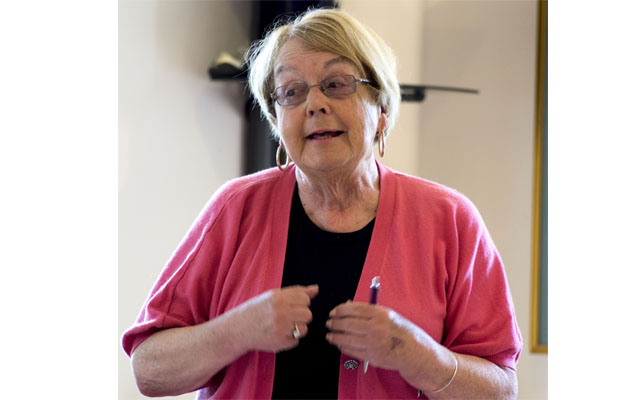
As rural communities around the state struggle with the costs of local government, the “interlocal” shared services model of Castle Hill, Chapman and Mapleton is waiting for others to consider emulating, said Patricia Sutherland.
A life-long Chapman resident, former legislator and current chair of the town select board, Sutherland said she’s thankful for the town leaders of the 1970s, who started what in 1992 was formalized as a state-approved “interlocal” agreement for shared services.
“Chapman and Castle Hill would never be able to provide the services to our citizens that we do if we were by ourselves,” Sutherland said. “We would not be able to afford that with our own tax base.”
Castle Hill and Chapman each have less than 500 residents, and Mapleton has more than 1,800, and together the three towns share a town manager and a range of government services, including snow plowing, road maintenance, a volunteer fire department and a recreation program.
While sharing municipal services, the towns still each have their own select boards and their own local laws. In 2015, Chapman residents voted to adopt a land use ordinance in place in Mapleton, while Castle Hill voters rejected it.
“We don’t have to adopt ordinances or policies for our towns that we don’t want to,” Sutherland said. “We don’t take local control away.”
The interlocal agreement lets the towns “retain individuality while we all share common needs and resources,” Sutherland said.
The three towns have property rates well below the average in Aroostook County, with Mapleton’s being the highest of the three in 2016 at $15.7 per $1,000 of property value.
Other municipalities are starting to take steps to share services at different levels of government, as are some local school districts in sharing superintendents and administrative services.
Last year, Madawaska and St. Agatha adopted agreements for both towns to share Madawaska’s community development director and part-time deputy clerk. Madawaska’s code enforcement officer is also shared with St. Agatha and Eagle Lake during peak building construction in spring and summer.
In central Aroostook County, Mars Hill has agreements for fire protection in the towns of Blaine and Westfield, as well in the unincorporated township of E Plantation.
Other efforts to collaborate by larger local governments have not gone far and other existing arrangements have not always been well received by some residents.
Jon Frederick, the former town manager for Castle Hill, Chapman and Mapleton who left for a municipal job in his native New Hampshire in early March, said that the towns’ residents were taken aback by Presque Isle’s recent decision to end the pay-as-you-throw trash bag program.
The three towns are among the municipalities that pay Presque Isle for the use of the city’s landfill and had been using the trash bag program without many complaints, Frederick said. But they “have zero say in the running of the landfill or its operations and weren’t asked” about ending pay-as-you-throw, Frederick said.
Some residents in the towns, he added, are “leery” of further service sharing arrangements with Presque Isle, although the Star City still remains as a “service center” community, where many people from the three towns and others shop, work or go to school.
Castle Hill, Chapman and Mapleton are the only the municipalities in the state with an interlocal agreement for all local government services, but Sutherland suggests others could make it work too.
“We get a lot of inquiries. People are amazed that it works,” Sutherland said. “They ask me, ‘How do you guys do that?’ I say, ‘Because there is trust.’”
The towns’ interlocal agreement evolved before each individual town had a chance to grow its own government operation with its own employees, and fears of job cuts along with service reductions are some of main concerns in municipal service sharing. But their model is sound and has “stood the test of time” in terms of government efficiency, said Frederick.
Sutherland said she thinks the towns are an example of how rural communities can move forward despite a lean economy and aging population.
“We don’t hear, ‘This town is drying up.’ We hear positive things,” Sutherland said. “We know the population is increasing in Mapleton, and there were more weddings and births than deaths in Chapman last year. Our road has a few pre-schoolers. That makes everybody happy to see young families.”







